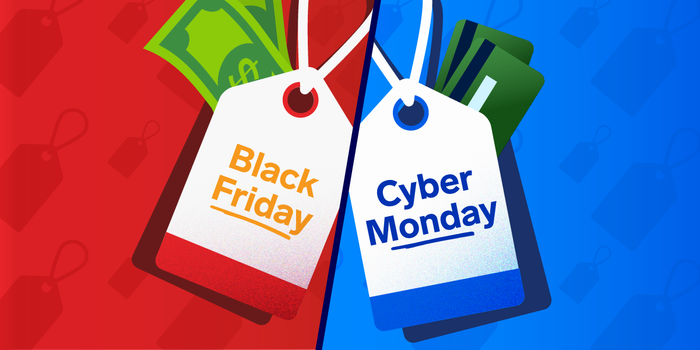Introduction
The holiday season is a time of excitement, and for many shoppers, it kicks off with two major shopping events: Cyber Monday vs Black Friday. These two days offer some of the year’s best deals and discounts, but each has unique benefits and strategies to maximize savings. This guide will break down the Cyber Monday vs Black Friday, advantages, and shopping strategies for both days, helping you decide which day is best for scoring your desired items at the best prices. Let’s dive into the ultimate comparison between Black Friday and Cyber Monday.

Table of Contents
- Overview of Black Friday and Cyber Monday
- History of Black Friday and Cyber Monday
- Differences Between Black Friday and Cyber Monday
- Shopping Experience
- Types of Deals
- Product Categories
- Availability of Stock
- Pros and Cons of Black Friday
- Pros and Cons of Cyber Monday
- Best Strategies for Black Friday Shopping
- Best Strategies for Cyber Monday Shopping
- Choosing Between Black Friday and Cyber Monday
- Top Tips for Maximizing Savings
- FAQs
1. Overview of Black Friday and Cyber Monday
Black Friday, traditionally the day after Thanksgiving in the U.S., marks the beginning of the holiday shopping season. Known for in-store and online sales, it offers deals on everything from electronics to fashion.
Cyber Monday, which follows Black Friday, is an exclusively online shopping event created to encourage people to shop online after the Black Friday rush. This day is known for discounts on tech items, gadgets, and online-exclusive deals.
Both days offer significant savings, but depending on what you’re shopping for, one may be better suited than the other.
2. History of Black Friday and Cyber Monday
Black Friday began as a term back in the 1950s as a way to describe the throngs of people that showed up after Thanksgiving. Subsequently, it became a big marketing day with a multitude of great sales and the starting point for the Holiday shopping period.
Cyber Monday was created in 2005 by the National Retail Federation to promote online shopping. The purpose was to cater to those who missed out on Black Friday or to those who just wished to shop at home from their computers with some good offers. Since then, it has grown into a major shopping day with exclusive digital deals.
3. Differences Between Black Friday and Cyber Monday
a) Shopping Experience
- Black Friday: Traditionally an in-store event, though online sales have become more common. Shoppers may experience crowded stores and limited quantities.
- Cyber Monday: Entirely online, allowing shoppers to browse and purchase from the comfort of their homes.
b) Types of Deals
- Black Friday: Known for doorbuster deals, especially on big-ticket items like TVs and appliances.
- Cyber Monday: Offers significant discounts on tech, gadgets, and online-exclusive products, sometimes with additional digital perks.
c) Product Categories
- Black Friday: Best for big-ticket items such as TVs, appliances, and home goods.
- Cyber Monday: Ideal for tech, gadgets, fashion, and accessories. Digital services and subscriptions often have discounts as well.
d) Availability of Stock
- Black Friday: Physical stores often have limited stock, so items can sell out quickly. Some online retailers also limit quantities to create urgency.
- Cyber Monday: Retailers may have larger online stock or offer restocks on popular items that were sold out on Black Friday.
4. Pros and Cons of Black Friday
Pros:
- In-store shopping experience with instant gratification.
- Huge discounts on a wide range of products.
- Access to doorbuster deals and in-store exclusives.
Cons:
- Crowded stores and long lines.
- Items may sell out quickly, especially popular doorbusters.
- Limited deals on smaller items and tech accessories.
5. Pros and Cons of Cyber Monday
Pros:
- Convenience of shopping from home.
- Often more discounts on electronics, tech accessories, and fashion.
- Great for people who missed Black Friday or want additional deals.
Cons:
- Some deals may not be as steep as Black Friday doorbusters.
- High online traffic can cause website slowdowns or crashes.
- Items may sell out quickly, especially in popular categories like electronics.
6. Best Strategies for Black Friday Shopping
- Make a Shopping List: Prioritize what you want to buy to avoid impulse purchases.
- Research Prices: Know the usual price of items to ensure you’re getting a true discount.
- Plan to Arrive Early: If shopping in-store, arrive early to snag the best deals.
- Check Store Policies: Familiarize yourself with return policies, as some stores have stricter rules for Black Friday sales.
- Use Store Apps: Many stores offer mobile app exclusives or allow you to scan items to check prices quickly.
7. Best Strategies for Cyber Monday Shopping
- Set Up Accounts in Advance: Avoid last-minute delays by creating accounts on your favorite shopping sites.
- Join Email Lists: Sign up for email lists to receive exclusive discounts and early access.
- Use Coupon Codes: Look for online coupon codes that can offer extra discounts or free shipping like with Savings4everyone.
- Shop Early: Popular items may sell out quickly, so shop early to ensure availability.
- Check Social Media: Many brands share exclusive deals and coupon codes on their social media platforms.
8. Choosing Between Black Friday and Cyber Monday
For Big-Ticket Items: Black Friday is generally better for large electronics, appliances, and furniture. Doorbuster deals offer significant savings on these products.
For Tech and Accessories: Cyber Monday is often the better choice for tech, gadgets, and online-only deals. Items like headphones, smart home devices, and fashion accessories are typically discounted more on Cyber Monday.
For Convenience: If you prefer to avoid crowds and shop from home, Cyber Monday offers a comfortable, online-only shopping experience.
9. Top Tips for Maximizing Savings
- Compare Prices: Use comparison tools or websites to ensure you’re getting the best price.
- Follow Retailers on Social Media: Some brands offer followers exclusive codes or early access to sales.
- Check Return Policies: Make sure the items you’re buying can be returned, especially if they’re big-ticket items.
- Stay Organized: Keep track of all your orders and their shipping status to avoid missing deliveries.
- Set a Budget: Avoid overspending by setting a budget and sticking to it.
10. FAQs
Q. Is it better to shop on Black Friday or Cyber Monday?
A. It depends on what you’re shopping for. Black Friday is generally better for in-store deals on big-ticket items, while Cyber Monday is ideal for tech and online-exclusive deals.
Q. Are Cyber Monday deals just leftovers from Black Friday?
A. Not necessarily. Many retailers offer different deals for Cyber Monday, especially on tech, gadgets, and online-exclusive items.
Q. Do prices drop further after Cyber Monday?
A. Some deals may extend into the following week or reappear in end-of-year sales, but the best discounts are usually reserved for Black Friday and Cyber Monday.
Q. Can I return items bought on Black Friday or Cyber Monday?
A. Return policies vary by retailer. Some may have stricter rules for holiday sales, so check the policy before purchasing.
Q. How can I find the best deals?
A. Use price comparison websites, sign up for retailer newsletters, and follow brands on social media for exclusive discounts and early access.
This guide should help you navigate Black Friday and Cyber Monday with confidence, ensuring that you get the best deals possible. Whether you’re shopping in-store or online, planning and strategy are key to maximizing your savings. Happy shopping!
Recommended Article: Black Friday Free Shipping for Online Shopping




